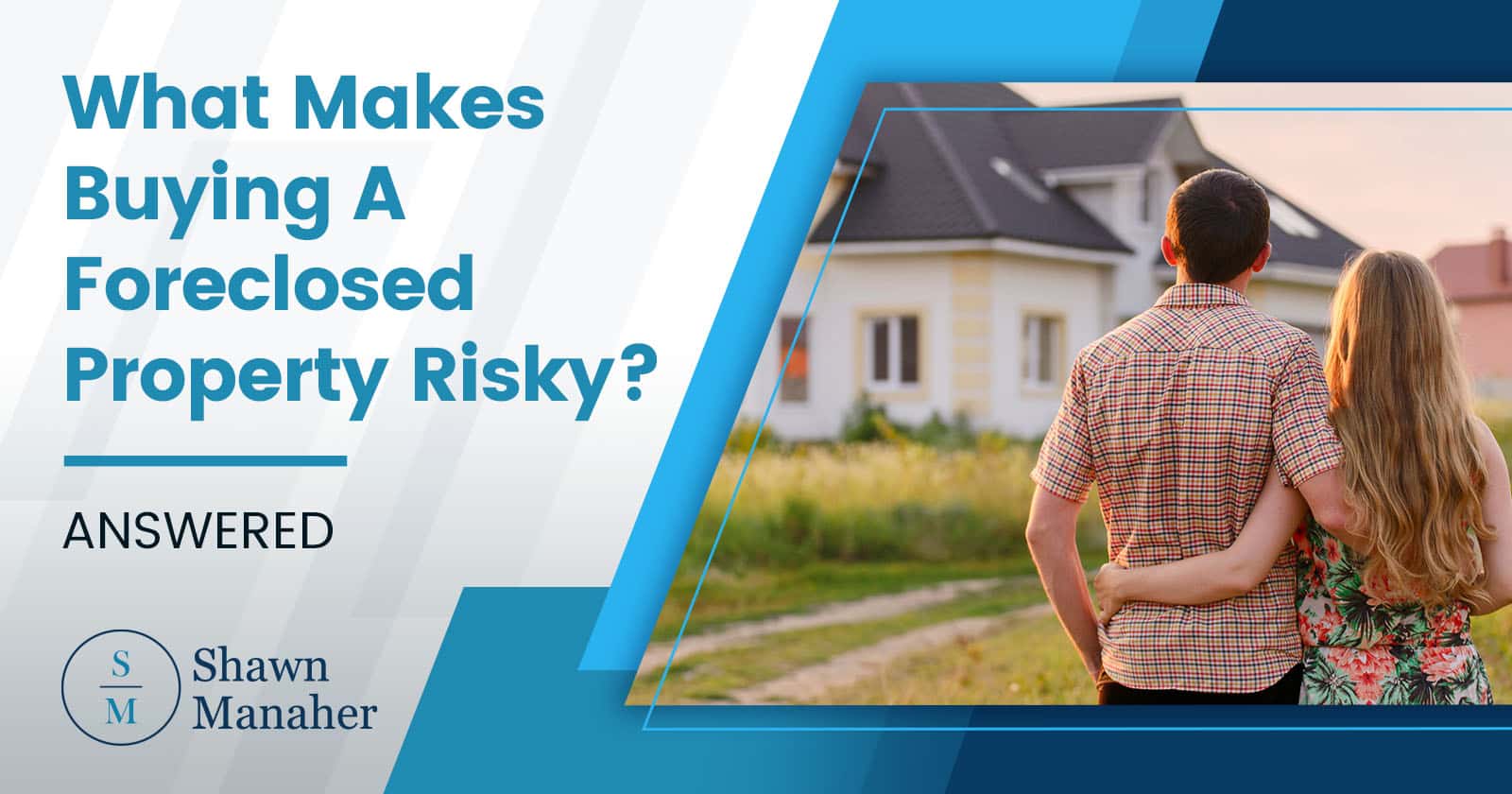

Buying a foreclosed property can make it much easier to afford a property, but it is not without its risks. Discover why buying foreclosed properties is risky so you can evaluate whether you want to take the risk.
There are multiple risks in buying a foreclosed property, including the risk of overpaying, potential hidden costs, the inability to get financing, as-is sales, and potential occupants. Even so, it may be worth the risks, especially if you mitigate them.
Explore the risks of buying a foreclosed property in more detail, learn how to mitigate them, and get a refresher on the benefits of buying a foreclosed property.
Real estate is a very popular investment. It is useful and tends to reliably grow in value over time. However, there are risks when buying a home, such as potential expenses. Look at the risks of buying a foreclosed property so you can make an informed decision before buying one.
Before getting into the risks of buying foreclosed properties, make sure you understand what it means for a property to be foreclosed. A foreclosure occurs when the property owners can’t make their mortgage payments, so the lender sells the property to recover their costs.
There are a few types of foreclosures. Power of sale or statutory foreclosures occur if the mortgage has a power of sale clause. This lets the lender sell the property if payments aren’t made and the foreclosure doesn’t require any judicial involvement. This is possible in 29 states.
Judicial foreclosures require lenders to file a suit before they can start the foreclosure. The buyer then has 30 days to catch up on their loan payments. If they don’t, the property gets auctioned off by the court or the county sheriff.
Finally, a strict foreclosure is only possible in Connecticut or Vermont. This requires the lender to file a suit against the borrower. The court gives the borrower a limited time to pay their mortgage. If they don’t pay, the property title automatically goes to the lender without any sale.
With a better understanding of foreclosures, what are the risks of buying these properties?
While most people think of foreclosures as a good way to buy a home for cheap, this isn’t always the case. It is very easy to have to pay more than the property is worth, especially in an auction. Bids can easily get out of control at an auction, and some people will drive the bids higher on purpose.
The good news is that you can overcome this risk by giving yourself a budget or a maximum bid.
It is incredibly hard to get a mortgage if you are buying a foreclosed property. That is especially true for conventional loan options and FHA loans. Without a loan, you would need to pay for the entire value of the property in cash.
Why is it so hard to get a loan for a foreclosed property? Because of all the risks mentioned here. Mortgage lenders know that foreclosed properties are riskier, and they don’t want you to end up having to make unexpected repairs that you can’t afford. That could affect your ability to pay the mortgage on time.
Although rare, some lenders do have options for buying foreclosed homes. You might also be eligible for a rehab loan. If you do that, however, remember that flipping the property won’t make economic sense because of the conditions of the loan.
It is also possible that you would be eligible for a conventional or government-backed loan when buying a foreclosed property. This will depend on the condition of the property, likely including factors like if it is in “livable condition.”
We already mentioned potentially overpaying for a foreclosed home in an auction, but unexpected costs can also cause you to overpay. This is especially true if this is your first time buying a foreclosed property.
Some of those unexpected costs may come from the title fee. There may also be additional costs associated with inspections. That is assuming that you can even have an inspection done, which is not always an option on foreclosed properties.
Yet another unexpected cost could be liens on the property. In some cases, you may be responsible for fees from the original foreclosure. If there are liens on the property, you may have to pay those before you can get title insurance, meaning there is no way to avoid these extra costs.
You can reduce the risk of liens by doing a title search before buying the property. This should show any liens or previous judgments on the property.
On top of those potential costs, you also risk dealing with undisclosed property problems. Most foreclosed properties are sold as-is. As such, the seller has no legal responsibility to disclose any problems to you. You have to find them yourself by hiring an inspector.
You may get lucky and buy a foreclosed property where everything is in good shape. But it’s more than likely that you will have to make at least minor repairs. The big concern is that you would need major repairs, such as foundation work or a new roof.
Remember that if a home is foreclosed, that means the previous owners couldn’t make mortgage payments. It is not a stretch to assume that they couldn’t pay for repairs or even regular home maintenance if they couldn’t afford mortgage payments. This increases the chances of needing repairs.
There are two good strategies for mitigating this risk. First, always hire an inspector before buying a foreclosed property when possible. This may not be possible if you are buying the home in an auction. Even if you aren’t buying it in an auction, you may not be able to get an inspection done. It will depend on the situation and the current owner. Second, keep funds in reserve to handle potential issues. You don’t want to be caught off guard by the need for repairs and struggle to find funds.
While there can be delays when buying any property, this is especially true with foreclosed properties. There are more delays during foreclosure sales in general but even more during the closing process, specifically the escrow phase.
Keep in mind that some potential delays can come from the fact that you are buying from the financial institution that seized the property from their borrower. They have enough power and money to simply wait until they get the best possible terms for the sale. While many choose to complete the sale quickly, it is still possible they will wait.
You can reduce the risk of delays during your foreclosed property purchase by choosing an experienced real estate agent. Specifically, make sure they have experience buying foreclosed properties. They should also have experience buying properties from the financial institution or lender selling the property.
Depending on how fast the foreclosure process moved, it’s possible that the home sat vacant for a while. This could mean that basic maintenance wasn’t done during that time. It could also have given vandals the opportunity to cause damage.
In some situations, you may buy a foreclosed property that still has occupants inside. For example, this is possible with a real-estate-owned property. In this case, you may have to file a formal notice of eviction. Depending on the state you live in, it can take 30 to 90 days for the eviction to happen. And if they don’t respond to the eviction notice, you may have to file an unlawful detainer, which can take another 30 to 60 days.
The biggest reason that people choose to buy a foreclosed property is the potential for a low cost. It is very common to find opportunities in foreclosed properties selling for much less than they are worth—or at least for much less than comparable properties in the area.
This is common because the lender typically wants to sell the property quickly. Pricing a property low is a popular strategy for selling it fast. In the lenders’ mind, getting some money for the property soon is better than having to wait longer. They get to take the property off their books and move on.
Of course, this is not always the case. Financial institutions have enough assets to hold out until a better sale; they won’t be hurting for cash flow in the meantime.
The biggest risks of buying a foreclosed property are financial. Between potential liens on the title, hidden damage, and the need for repairs, you may find yourself with unexpected costs. On top of that, it will be hard to get a mortgage for the property. Even so, you may want to evaluate your situation and decide if a foreclosed property is right for you. If you do buy one, work with a real estate agent with experience in foreclosed properties and keep a cash reserve on hand for unexpected expenses.

